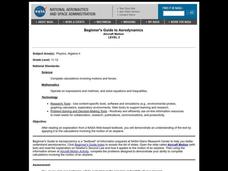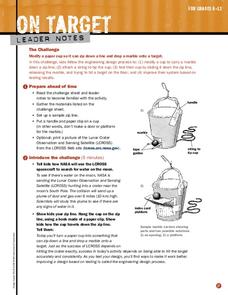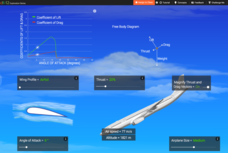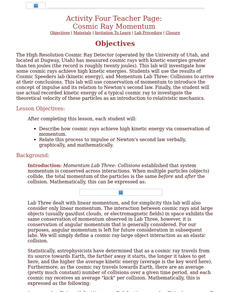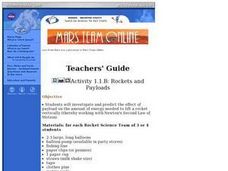CK-12 Foundation
Unicycle
What is the steepness of a hill before a unicyclist slides down it rather than pedaling down it? The simulation graphs the wheel speed versus the unicycle speed as the rider goes down a hill. Scholars control the mass of the rider,...
Curated OER
Newton's Third Law
Students describe an everyday situation which demonstrates Newton's Third Law. They state Newton's Third Law;"Every action has an equal and opposite re-action, or every force has an equal and opposite force" in their own words. ...
Curated OER
Exploring Force and Motion
Students explore the concepts of force and motion by creating a video. In this physics lesson, students are assigned one particular aspect of force and motion to investigate and work in groups to create a video that will be presented to...
Curated OER
F = a, Inertia, and Friction
Fourth graders use a matchbox car to push across a hard surface and observe what happens. They then push the car across a soft or rough surface and discover what happens. The two ideas are discusses as Newton's First and Second Laws of...
Curated OER
FRAMES OF REFERENCE: THE BASICS
Students examine the concept of frames of reference in physics: that two frames of reference, each moving with respect to the other with a constant velocity v, observe the same accelerations and therefore Newton's laws are the same in both.
Curated OER
Blast Off!
Students build their own rockets. In this rocket activity, students create the highest flying rocket they can powered by effervescent antacid tablets and water in film canisters. They listen to the story How to Build a Rocket by Hazel...
Curated OER
Newton's 2nd Law
Fourth graders discuss Newton's Second Law of Motion, and the acceleration of fast and slow moving objects. They experiment with items with different masses to determine the effect mass has on acceleration using a toy car. They complete...
Curated OER
Rockets
Students are introduced to a project involving rockets. After chosing a rocket of their own, they assemble them in class and use an open field for launching them. They relate the path of their rocket to Newton's Second and Third Laws...
Curated OER
Aircraft Motion
Students, after reading an explanation from a NASA Web-based textbook, demonstrate an understanding of the text by applying it to the calculations involving the motion of an airplane.
Curated OER
Aircraft Motion
Students, after reading an explanation from a NASA Web-based textbook, demonstrate an understanding of the text by applying it to the calculations involving the motion of an airplane.
CK-12 Foundation
Elevator
Do you weigh slightly less when an elevator first starts its descent? The simulation teaches the change in the force based on the acceleration, constant speed, or deceleration of an elevator. Scholars control the mass and acceleration...
NASA
On Target
NASA's LCROSS mission is dropping a probe into a lunar crater. Groups design a system to travel down a zip line and drop a marble onto a target in the classroom. The groups then modify their designs based upon testing.
CK-12 Foundation
Airplane
How does an airplane control its take off and descent? Scholars explore the forces acting on an airplane and control the angle of attack, wing profile, thrust, and airplane size. They learn about lift, drag, thrust, gravity, and the...
CK-12 Foundation
Horse and Cart
Can a horse pull more than its weight? A simple simulation answers this question and more. Pupils adjust the mass in a cart, the mass of the horse, the acceleration of the horse, and the angle of the tension rope between the horse and...
CK-12 Foundation
Bowling Alley
Sometimes it appears that a bowling ball slides down the alley rather than rolling, while other times it appears to switch rolling directions at some point. Scholars control the bowling ball size, initial rotation, initial speed, and...
Museum of Science
Cup Drop
Create egg drop soup. Teachers first set up eggs that are held up above cups of water with a piece of cardboard and cardboard tubes. Learners try to determine a way to get the eggs to drop into the cups. Using a broom, the instructor...
Curated OER
Inertia
Students become actively involved with Newton's First Law of Motion, which involves inertia.
Curated OER
Cosmic Ray Momentum
Students describe how cosmic rays achieve high kinetic energy via conservation of momentum.
Curated OER
Vectors
Students are introduced to the bridge building challenge. They perform two labs and work in small groups to finish the vector worksheet. Students review vector additions. They then move onto the Forces on an Inclined Plane Lab. ...
Curated OER
Activity One Teacher Page: Vehicles In Motion
Students identify variables that affect the system, and specify which variables are independent and which are dependent.
Curated OER
Rectilinear Motion
Twelfth graders rewrite word problems using algebraic expressions. In this calculus lesson plan, 12th graders calculate the velocity, time and acceleration while analyzing real life scenarios. They solve problems related to when the...
LABScI
Kinematics: The Gravity Lab
Falling objects can be brutal if you don't protect your noodle! Scholars explore the motion of falling objects through measuring short intervals to determine if the distance traveled varies with time. Building off of this, scholars...
Curated OER
The Science of Swinging
Students learn how a pendulum works in the concept of an amusement park ride. In this pendulum lesson, students are introduced to Newton's first law of motion and how it works in an amusement park ride. Continuous motion and inertia are...
Curated OER
Rockets and Payloads
Students investigate Newton's Second Law of Motion as they predict the effect of a payload on the amount of energy needed to lift a rocket vertically. The constraints of the weight of the equipment carried to Mars is compared to the...











